|
|
| CÔTE D'IVOIRE stressed
the importance of involving stakeholders, especially indigenous and
local comm unities, on the Expert Panel on Access and Benefit Sharing. |
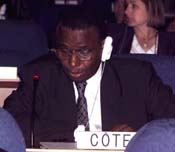 |
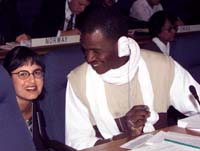 |
On acess to genetic resources, MALI,
on behalf of the African Group, said national legislation alone will
be insufficient and recommended initiating a process to develop a
protocol along the lines of the IUPGR regarding: ABS; protection of
indigenous and local communities; recognition of the origin of resources;
and biopiracy. The delagate of Mali is seen here with the ENB's Nabiha
Megateli |
| ARGENTINA recommended
that the Expert Panel on Access and Benefit Sharing identify training
areas to be funded by the GEF, such as negotiating capacity on ABS
arrangements. |
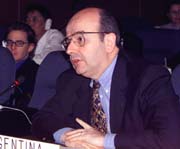 |
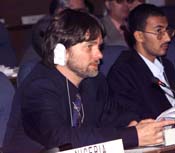 |
NORWAY noted it was premature to change
TRIPs and opposed granting patents for animals and plants. |
| WWF said exemptions under
TRIPs need to be maintained until there has been adequate experience
with sui generis systems. |
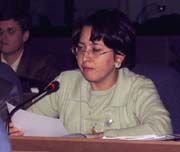 |
 Guyana,
on behalf of the G-77/CHINA proposed focusing on ABS, ex situ
collections, and harmonization of intellectual property rights
(IPR) and the CBD. Guyana,
on behalf of the G-77/CHINA proposed focusing on ABS, ex situ
collections, and harmonization of intellectual property rights
(IPR) and the CBD.
|
 CAMEROON,
on behalf of the African Group, highlighted the potential for
TRIPs to jeopardize Farmer's Rights and CBD application. He suggested
requesting the TRIPs Council to defer decisions reviewing patent
excludability until after COP-5 and recommended inviting the Council
to address potential conflicts with the CBD CAMEROON,
on behalf of the African Group, highlighted the potential for
TRIPs to jeopardize Farmer's Rights and CBD application. He suggested
requesting the TRIPs Council to defer decisions reviewing patent
excludability until after COP-5 and recommended inviting the Council
to address potential conflicts with the CBD
|
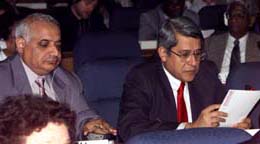 |
 INDIA said
IPR are not the main mechanisms for realizing equitable benefit-sharing
and the synergies between the CBD and TRIPs have not been adequately
treated. INDIA said
IPR are not the main mechanisms for realizing equitable benefit-sharing
and the synergies between the CBD and TRIPs have not been adequately
treated. |
| DJIBOUTI emphasized the
need for provision of financial resources for genetic resource issues |
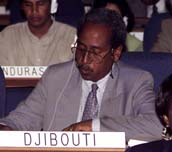 |
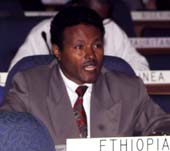 |
 ETHIOPIA,
on behalf of the African Group, supported bringing ex situ materials
collected prior to the CBD's entry into force under CBD provisions.
He also supported strengthening and establishing gene banks in developing
countries and making GEF funding available. ETHIOPIA,
on behalf of the African Group, supported bringing ex situ materials
collected prior to the CBD's entry into force under CBD provisions.
He also supported strengthening and establishing gene banks in developing
countries and making GEF funding available. |
 The EU said
information exchange about ex situ collections would be helpful said
the CBD had no retroactive effect regarding these collections. The
EU recommended that COP-5 focus on the role and functions of the roster
of experts on this issue. The EU said
information exchange about ex situ collections would be helpful said
the CBD had no retroactive effect regarding these collections. The
EU recommended that COP-5 focus on the role and functions of the roster
of experts on this issue. |
 |
 |
View from the public gallery |










